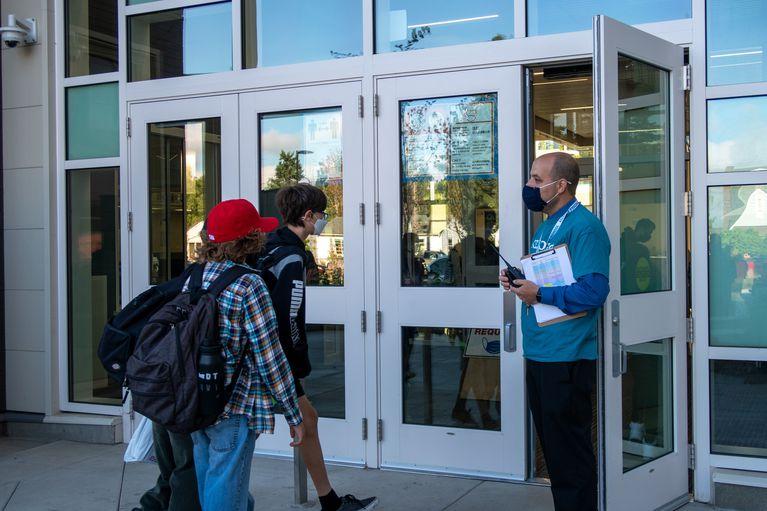
Oregon’s education and health leaders say if schools continue to host extracurricular activities, “they should expect rapid transmission of COVID-19″ that could prevent students from being able to attend class in-person due to isolation and quarantine periods.
Oregon’s education and health leaders put out that warning in an advisory Monday. The agencies say schools and organizations must either pause extracurricular activities or ensure they follow specific COVID-19 safety protocols.
If schools choose to continue extracurriculars, the agencies said they need to clearly communicate the potential risks to families.
The message from the Oregon Department of Education and Oregon Health Authority comes as schools around the state begin their new terms and the omicron variant of the coronavirus continues to spread.
“It’s all about trying to continue to ensure that our students can attend school in-person every day,” ODE Director Colt Gill told OPB Monday.
Gill said that includes schools continuing to enforce the mitigation efforts they have already been using — including wearing appropriate face coverings, following physical distancing guidelines, frequent hand washing and use of ventilation systems.
The new advisory encouraged schools to implement free COVID-19 testing programs.
Seattle Public Schools closed schools Monday to offer voluntary COVID-19 testing for staff and students amid a surge of new omicron cases. ODE said Oregon is not considering something similar.
The ODE and OHA advisory also encouraged schools to retrain school staff on safety protocols, as well as educate employees, students and families about COVID-19 symptoms. But the biggest change suggested in the advisory has to do with activities beyond the school day.
“[W]e have really asked our schools and other organizations that serve students to really be thoughtful about their extracurricular activities,” Gill said.
That includes either pausing extracurricular activities or making sure they use the same safety protocols that are in place during the school day, such as face coverings.
“We know those mitigation efforts work and they have been preventing the spread of COVID-19, but we don’t often use those in extracurricular activities such as sports, and we’re really worried we’ll see rapid transmission in those settings unless communities come together and use the same kinds of protocols we use during the school day after the school day,” Gill said.
The agencies are also asking families and community members to do their part in helping ensure schools can continue in-person teaching and learning. Namely, ODE and OHA are urging parents to keep students home if they have COVID-19 symptoms. The agencies are also encouraging families and children to get vaccinated and get COVID-19 booster shots, and to limit non-essential activities and gatherings.
“Spread in the community is what may cause a school eventually to close to in-person instruction and go back to online learning for a short period of time,” Gill said. “The more communities can do to make sure individuals are vaccinated and boosted so there’s less likelihood that they’re spreading COVID-19 from one person to another, or less likely that they may need the services of a hospital and really tax that system — that will help keep our school staff safe and our students safe and keep them in in-person instruction.”
ODE Communications Director Marc Siegel said the agency is not planning a statewide return to distance learning, like what happened at the beginning of the pandemic in March 2020. But, individual school districts will be able to make that call themselves if necessary.
“For each school district, that’s a local school district decision, made in coordination with local health authority,” Siegel told OPB.
This story was originally published by Oregon Public Broadcasting.